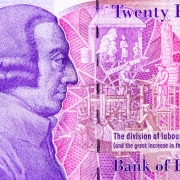Entrepreneurship Is The Science Of Making People More Valuable To Each Other.
Adam Smith wrote, “Man naturally desires, not only to be loved, but to be lovely.” That may strike you as an odd sort of language for an economist to use, but it is not. Smith was a system builder, and the system he was exploring was what Enlightenment scholars called The Science Of Man. In Theory Of Moral Sentiments, he was making the case that moral relations between human beings can emerge naturally from collaboration. In any society, people are engaged in exchange – exchanging words, exchanging morals, exchanging relationships. We quickly realize that the greatest good for all is achieved when those relationships are based on mutually acceptable and beneficial moral values. The goals we seek are to be loved – to be seen by others as morally worthwhile – and to be lovely – to deserve and earn the praise of others.
Adam Smith went on to study another aspect of exchange between people, the one today we call economics. To enjoy the fruits and benefits of economic life, people also engage in exchange. We exchange our skills, our labor, and the products of our work. For this exchange to be mutually beneficial it must be not only moral but also a source of value for both parties. Each one feels that they got more out of the exchange than they gave. They feel loved (their offer was accepted) and lovely (they did a good job).
One form of economic exchange is giving labor in exchange for wages, in the arrangement we call employment. When we do this, we have in mind the creation of a future stream of value. We anticipate that, if we continue to exert valuable effort for our employer, we will receive a flow of money wages extending into the long term future. We might also anticipate some promotions and wage increases, especially if we increase our valuable skills through experience (learning-by-doing) and incremental educations (qualifications and certifications).
If we choose the entrepreneurial route, we anticipate the creation of two future streams of value. First, we must create value for others – that means, making them more valuable. If an entrepreneur sells a service to a customer, the customer enters into the exchange because they believe they’ll be more valuable after the exchange. The customer buys marketing services because they feel they’ll create more consumer awareness or conversion as a result. Or buys legal services because they feel they’ll write better contacts or avoid some anticipated problems of litigation. Or buys technical services because they feel they will operate with greater efficiency.
Similarly, with the sale of products to consumers. The consumer, of course, buys the product because they would rather experience its benefits than retain the dollars they spend to acquire it. The consumer becomes more valuable to their kids as a mom as a result of their purchase decisions on their behalf. A father becomes more valuable when he buys a baseball bat in order to introduce his son to a sport, and all the learning that accompanies participation and team play. A tax accountant might help parents retain more of their income for the good of their family. A car dealer helps workers with their daily commute. A yoga trainer helps people with their physical and mental health.
Moreover, the entrepreneur’s taking the product to market where it can be purchased makes many more economic actors more valuable. The entrepreneur who sells products through Walmart or amazon.com helps all the workers at those firms to earn their wages, feel stability and feel useful in the economy. Another entrepreneur who sells plumbing services helps fellow entrepreneurs who sell tools or accounting or tires or gasoline or phone service.
Viewed in this way, capitalism is a system in which people try to make each other more valuable and are rewarded for doing so. They don’t have to feel charitable. To quote Adam Smith again, “It is not from the benevolence of the butcher, the brewer or the baker that we expect our dinner, but from their regard to their own interest”. If they know what others need in order to feel more valuable, entrepreneurs can design and offer products and services to meet that need, and find out quickly, through the market feedback of customers buying or not buying, whether they got it right or not. If the signals are negative, or not so good, the entrepreneur adjusts to improve the product, until the market indicates that it’s right. How does the entrepreneur read the mind of the consumer? Through empathy. Adam Smith called it Sympathy. It’s the natural fellow-feeling that we all have for each other, and we feel better – more loved – when we exercise it effectively.
Adam Smith wrote over 200 years ago. Since then, we have had more time and multiple market cycles to hone the science of making each other more valuable. And we’ve succeeded, as measured by GDP per capita or other measures of individual value.
There are many calling for an end, or a drastic change to this system, imposed from the top down, through government programs and government regulation. The problem with these top-down solutions is that the capitalist system of each of us helping our fellow man in the pursuit of our own self-interest is a self-governing system. It’s spontaneous. Every constraint renders it less effective and productive. Every subsidy and every entitlement gives someone permission not to try as hard as they otherwise would to help his or her fellow. Why should they, when their own income is secured by an entitlement, rather than by the rewards of the market? Or when their special interest group is subsidized so that they don’t have to try so hard to help others?
Untrammeled entrepreneurial capitalism makes everyone more valuable.




